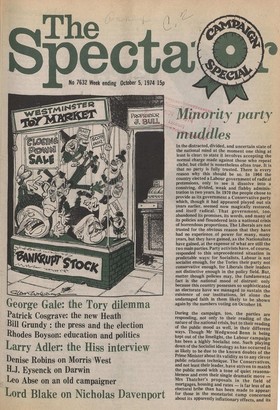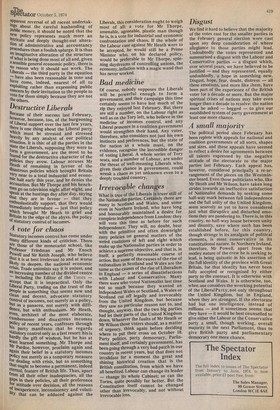Minority party muddles
In the distracted, divided, and uncertain state of the national mind at the moment one thing at least is clear: to state it involves accepting the normal charge made against those who repeat clichd, but cliche' is nonetheless often true. It is that no party is fully trusted. There is every reason why this should be so. In 1964 the country elected a Labour government of radical pretensions, only to see it dissolve into a conniving, divided, weak and flabby administration in two years. In 1970 the people chose to provide as its government a Conservative party which, though it had appeared played out six years earlier, seemed now magically restored, and itself radical. That government, too, abandoned its promises, its words, and many of its policies and floundered into a national crisis of horrendous proportions. The Liberals are not trusted for the obvious reason that they have had no experience of power for many, many years, but they have gained, as the Nationalists have gained, at the expense of what are still the two main parties. Party activists have, of course, responded to this unprecedented situation in predictable ways: for Socialists, Labour is not socialist enough, for the Tories their party not conservative enough, for Liberals their leaders not distinctive enough in the policy field. But, matter though policies may, the fundamental fact is the national mood of distrust: only because this country possesses so sophisticated an electorate have we managed to sustain the existence of our institutions, let alone the undamaged faith in them likely to be shown again by the numbers voting on October 10.
During the campaign, too, the parties are responding, not only to their reading of the nature of the national crisis, but to their reading of the public mood as well, in their different ways. Though Mr Wedgwood Benn is being kept out of the limelight, the Labour campaign has been a highly Socialist one. Such playing down of the Socialist ideology as has occurred is as likely to be due to the known doubts of the Prime Minister about its validity as to any clever public relations technique. The Conservatives, and not least their leader, have striven to match the public mood with a tone of quiet reasonableness and even their single dramatic move — Mrs Thatcher's proposals in the field of mortgages, housing and rates — is far less of an electoral bribe than has been made to appear: for those in the monetarist camp concerned about its apparently inflationary effects, and its apparent reversal of all recent undertakings about the careful husbanding of Public money, it should be noted that the ,new policy represents much more an intricate and deeply thought-out alteration of administrative and accountancy Procedures than a foolish splurge. It is thus imaginative alteration of the structure of what is being done most of all and, given a sensible general economic policy, there is no reason why it should not work. The Liberals — the third party in the equation — have also been reasonable in tone and have come, indeed, nearest of all to exploiting rather than expressing public concern by their invitation to the people to vote for them simply because they are not the others. De •
structive Liberals
Because of their success last February, however, because, too, of the burgeoning 01 Liberal support over the last few years, there is one thing about the Liberal party Which must be stressed and stressed neavily by any analyst of our political situation. It is this: of all the parties in the !tate the Liberals, supposing they were to Prin a government, are the most to be 'eared for the destructive character of the ncies they avow. Labour accuses Mr nieath of remaining in favour of the disastrous policies which brought Britain verY near to a total industrial and econoade halt early this year, and he denies the accusation. But Mr Thorpe and his henchmen go on television night after night, and 81:veak at the hustings day after day, saying that they are in favour — that they enthusiastically support, that they would inunediately introduce — just that policy vv,hich brought Mr Heath to grief and Eiritain to the edge of the abyss, the policy of statutory control of incomes.
vote for chaos
Statutory incomes control has come under nlanY different kinds of criticism. There are those of the monetarist school, like Professor Friedman and Mr Enoch Powell and Sir Keith Joseph, who believe that it is at best irrelevant to and at worse likely to deepen, the national economic crisis. Trade unionists say it is unjust, and an increasing number of the divided centre including the Editor of the Times — _accept that it is impractical. Only the Liberal Party, trading on the trust of the People in something that seems new and Clean and decent, advocate statutory control of incomes, not merely as a policy, ,blit as a panacea, not merely with diffiuence, but with enthusiasm. Mr Heath, even, architect of the most elaborate, Cumbersome and disastrous incomes licy of recent years, confesses through Ws party manifesto that he regards statutory control only as a last resort; his is hardly the gift of wisdom, but he has at least learned something. Mr Thorpe and Mr Pardoe, however, proclaim again and again their belief in a statutory incomes Po„ licy not merely as a temporary measure tor dealing with crisis, but as something that ought to become a permanent, indeed !terrial, feature of British life. Thus, apart 'rum all their other inadequacies, all the gaps in their policies, all their preference for attitude over decision, all the reasons of inexperience, inconsistency and volatilitY that can be adduced against the Liberals, this consideration ought to weigh most of all: a vote for Mr Thorpe, amenable, agreeable, plastic man though he is, is a vote for industrial and economic confrontation and chaos. If the whole of the Labour case against Mr Heath were to be accepted, he would still be a Prime Minister who, on his declared policy, would be preferable to Mr Thorpe, spinning daydreams of controlling unions, the economy, inflation with a magic wand that has never worked.
Bad medicine
Of course, nobody supposes the Liberals will be powerful enough to form a government, and their campaign this time certainly seems to have lost much of the zip they enjoyed last February. But, there are still a number, on the Labour right as well as on the Tory left, who believe in the medicine of incomes control, and any Liberal presence in a coalition government would strengthen their hand. Any voter, therefore, who considers not just his own instincts and preferences, but the state of the nation as a whole must, on the evidence, recognise the incredible danger of voting Liberal. A whole series of Tory seats, and a number of Labour, are under the threat of well-meaning Liberals who, given their chance in government, could wreak a chaos as yet unknown even to a deeply troubled country.
Irrevocable changes
What is true of the Liberals is truer still of the Nationalist parties. Certainly there are many in Scotland and Wales, and some even in Northern Ireland, who have long and honourably maintained a desire for complete independence from London: they will vote this time as before for such independence. They will, no doubt, bear with the primitive and often downright zany policies on general matters of the weird coalitions of left and right which make up the Nationalist parties in order to achieve a supreme objective, and that is, in itself, a perfectly reasonable course of action. But some of the causes of the rise of nationalism in Scotland and Wales are the same as the causes of the rise of Liberalism in England — a series of dissatisfactions with Labour and Conservative. Many there were who voted Nationalist last time not so much because they wanted an independent Wales or Scotland, a Wales or Scotland cut off legally and irrevocably from the United Kingdom, but because they saw no particular reason not to, and thought, anyway, that the two big parties had let their parts of the United Kingdom down. Whatever the faults of Mr Heath or Mr Wilson those voters should, as a matter of urgency, think again before deciding where to put their cross on October 10. Party politics, party democracy, Parliament itself, and certainly government, has been going through a very bad patch in our country in recent years, but that does not invalidate for a moment the great and shining historical creation that is the British constitution, from which we have all benefited. Labour can change its leader — change its whole Cabinet; so can the Tories, quite possibly for better. But the Constitution itself cannot be changed other than irrevocably, and not without irrevocable loss.
Disgust
We find it hard to believe that the majority of the votes cast for the smaller parties in the February general election were cast upon any deep consideration of where allegiance to those parties might lead. Undoubtedly the votes represented and summarised a disgust with the Labour and Conservative parties — a disgust which, over several years, we have believed to be justified — and they represented, equally undoubtedly, a hope in something new. Disgust, hope, fear, doubt, distress — all these emotions, and more like them, have been part of the experience of the British voter for a decade or more. But the major spiritual ctises of nations may take even longer than a decade to resolve: the nation must be asked — begged — to give our established system of party government at least one more chance.
A small majority
The political period since February has been replete with appeals for national and coalition governments of all sorts, shapes and sizes, and these appeals have seemed to reflect a desire for agreements between all talents expressed by the negative attitude of the electorate to the major parties last February. Each appeal has, however, considered principally a re-arrangement of the pieces on the Westminster board. Even those politicians who, like Mr Heath and Mr Wilson, have taken long strides towards an ineffective satisfaction of Nationalist demands by seeking some half-way mark between full independence and the full unity of the United Kingdom, seem scarcely as yet to have considered just what disruptive and disturbed emotions they are pandering to. There is, in this country, no half-way house between unity and disunity, save where such has been established before, for this country, though strange in its amalgam of political elements, is most conservative in its constitutional nature. In Northern Ireland, therefore, Mr Powell, apart from the motley nature of the crew he is seeking to lead, is being quixotic in his assertion of the full identity of the province with Great Britain, for that identity has never been fully accepted or recognised by either party to the contract. It is otherwise with Scotland and Wales. It is otherwise, too, when one considers the wrecking potential of the Liberal Pa rty, not only throughout the United Kingdom, but in England, where they are strongest. If the electorate had but one intelligence, instead of millions — and it sometimes seems that they have — it would be best counselled to give either the Labour or the Conservative party a small, though working, overall majority in the next Parliament, thus to give British party and parliamentary democracy one more chance.

































